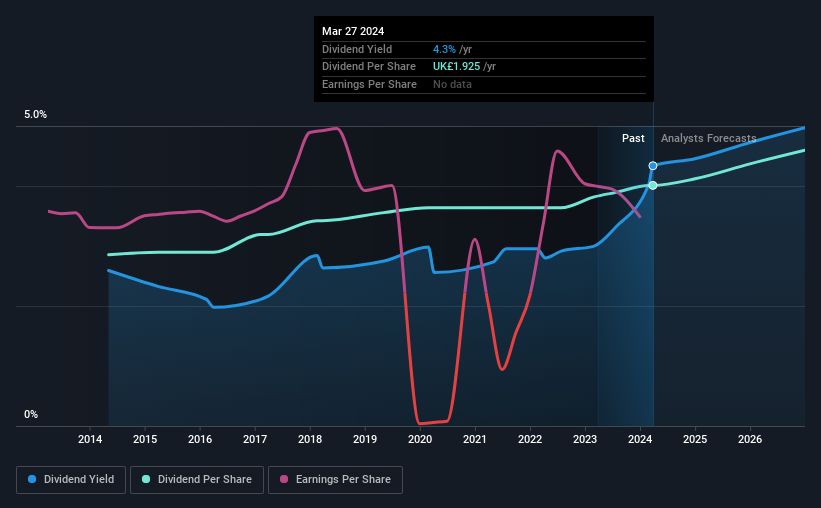- United Kingdom
- /
- Household Products
- /
- LSE:RKT
Reckitt Benckiser Group (LON:RKT) Is Paying Out A Larger Dividend Than Last Year

Reckitt Benckiser Group plc (LON:RKT) has announced that it will be increasing its dividend from last year's comparable payment on the 24th of May to £1.16. This makes the dividend yield 4.3%, which is above the industry average.
See our latest analysis for Reckitt Benckiser Group
Reckitt Benckiser Group's Payment Has Solid Earnings Coverage
A big dividend yield for a few years doesn't mean much if it can't be sustained. Before this announcement, Reckitt Benckiser Group was paying out 84% of earnings, but a comparatively small 62% of free cash flows. Since the dividend is just paying out cash to shareholders, we care more about the cash payout ratio from which we can see plenty is being left over for reinvestment in the business.
Looking forward, earnings per share is forecast to rise by 65.7% over the next year. Under the assumption that the dividend will continue along recent trends, we think the payout ratio could be 52% which would be quite comfortable going to take the dividend forward.

Reckitt Benckiser Group Has A Solid Track Record
The company has been paying a dividend for a long time, and it has been quite stable which gives us confidence in the future dividend potential. Since 2014, the annual payment back then was £1.37, compared to the most recent full-year payment of £1.93. This works out to be a compound annual growth rate (CAGR) of approximately 3.5% a year over that time. Dividends have grown relatively slowly, which is not great, but some investors may value the relative consistency of the dividend.
Dividend Growth May Be Hard To Come By
The company's investors will be pleased to have been receiving dividend income for some time. Unfortunately things aren't as good as they seem. It's not great to see that Reckitt Benckiser Group's earnings per share has fallen at approximately 5.5% per year over the past five years. If the company is making less over time, it naturally follows that it will also have to pay out less in dividends. Earnings are forecast to grow over the next 12 months and if that happens we could still be a little bit cautious until it becomes a pattern.
In Summary
In summary, while it's always good to see the dividend being raised, we don't think Reckitt Benckiser Group's payments are rock solid. The company has been bring in plenty of cash to cover the dividend, but we don't necessarily think that makes it a great dividend stock. We don't think Reckitt Benckiser Group is a great stock to add to your portfolio if income is your focus.
Investors generally tend to favour companies with a consistent, stable dividend policy as opposed to those operating an irregular one. At the same time, there are other factors our readers should be conscious of before pouring capital into a stock. For example, we've picked out 3 warning signs for Reckitt Benckiser Group that investors should know about before committing capital to this stock. Is Reckitt Benckiser Group not quite the opportunity you were looking for? Why not check out our selection of top dividend stocks.
New: AI Stock Screener & Alerts
Our new AI Stock Screener scans the market every day to uncover opportunities.
• Dividend Powerhouses (3%+ Yield)
• Undervalued Small Caps with Insider Buying
• High growth Tech and AI Companies
Or build your own from over 50 metrics.
Have feedback on this article? Concerned about the content? Get in touch with us directly. Alternatively, email editorial-team (at) simplywallst.com.
This article by Simply Wall St is general in nature. We provide commentary based on historical data and analyst forecasts only using an unbiased methodology and our articles are not intended to be financial advice. It does not constitute a recommendation to buy or sell any stock, and does not take account of your objectives, or your financial situation. We aim to bring you long-term focused analysis driven by fundamental data. Note that our analysis may not factor in the latest price-sensitive company announcements or qualitative material. Simply Wall St has no position in any stocks mentioned.
About LSE:RKT
Reckitt Benckiser Group
Manufactures and sells health, hygiene, and nutrition products worldwide.
Average dividend payer and fair value.
Similar Companies
Market Insights
Community Narratives



